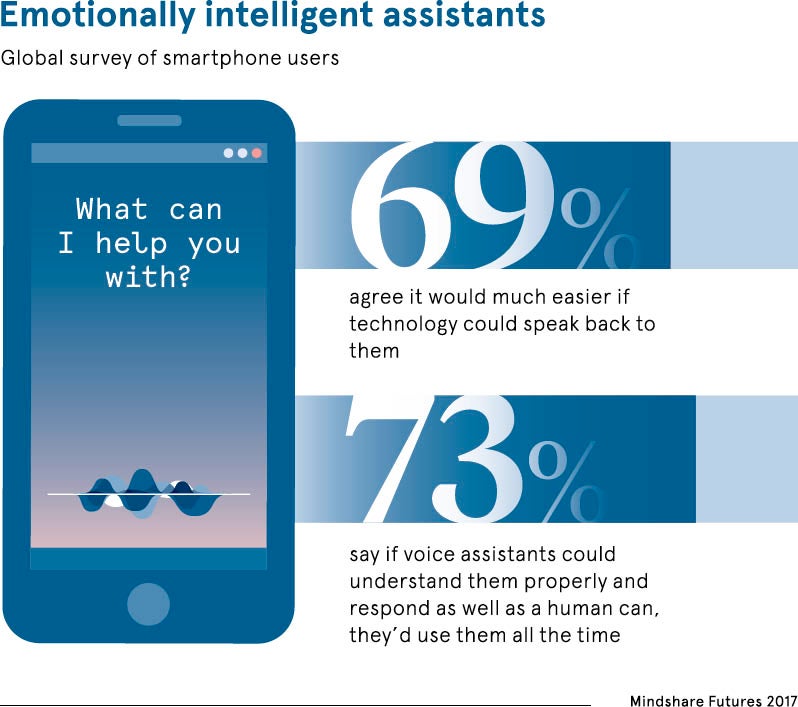From booking systems to customer and feedback services, chatbots are ubiquitous in business. But in areas, such as health or the home, people seem less willing to engage with what is effectively a computer running smart software or a machine that “learns” thorough artificial intelligence (AI).
However, businesses are increasingly taking advantage of advances in emotionally intelligent AI to open up new opportunities to gain people’s trust when it comes to more sensitive subjects.
Using emotionally intelligent AI to build trust with patients
Nowhere is the use for emotionally intelligent AI more apparent than in healthcare. When pharmaceutical company HRA Pharma Deutschland was looking at using a chatbot to give women in Germany advice on the morning-after pill, it needed it to do more than parrot its website. As well as using questions and answers to understand what people are looking for, it had to be discreet, private and put them at ease.
The chatbot, called Ella, launches on the www.pille-danach.de website when it detects behaviour suggesting someone hasn’t found an answer to what they’re looking for, using questions and answers to help people find what they need and encouraging them to share experiences they might not want to share with a human.
“We have created a sympathetic, reliable and easy-to-talk-to dialogue partner for girls and women facing an unbearable uncertainty of possibly becoming pregnant after unprotected sexual intercourse,” says Nadine Scholl, senior brand manager for women’s health. “In that situation, most women are emotionally heavily taxed and often unsure – unsure who to talk to and where to find answers to their questions. With our conversation design, Ella guides them through the most important questions and helps to quickly get the urgently needed information on the morning-after pill.”

That same drive for emotional intelligence was behind the creation by Boehringer Ingelheim (BI) of Tabatha, a Facebook Messenger-based AI chatbot to encourage people suffering from asthma symptoms to seek medical advice.
“In healthcare, if you layer emotional intelligence into a chatbot, it can make the bots very powerful,” says Maximilian Boost, head of social media at BI. “It was important for Tabatha to communicate with people who have asthma in a friendly, empathetic and informative way. Tabatha herself needed to appear emotionally intelligent as she was guiding people to self-identify with having asthma symptoms, while not imitating a doctor.”
Tabatha even learnt how to recognise emotions and what people meant when they expressed them, says Mr Boost. And while she’s upfront that she’s a chatbot, it hasn’t discouraged thousands of people from engaging with her. “We have been really impressed with how many people were willing to talk to Tabatha about their asthma symptoms and how it made them feel as a result,” he adds.
BI plans to continue its work with emotionally intelligent AI at its recently founded digital laboratory, BI X, working on several projects including the analysis of digital biomarkers to support early diagnosis of diseases such as Alzheimer’s.
The use of chatbots in global PR
It’s not just healthcare where emotionally intelligent AI can be useful. Catherine Keddie, managing director of healthcare at Cohn & Wolfe London, which worked with BI on the Tabatha project, sees it as a disruptive tool for communications and marketing.
“AI has incredible scope within the communications industry, for example the use of chatbots can revolutionise patient engagement within healthcare public relations,” she says. “The use of chatbots in global PR programmes is still in its infancy and even more so in the pharmaceutical industry. For us, it was the perfect solution for the evolution of a disease-awareness programme.”
For Swedish-based company Furhat Robotics, there are opportunities for emotionally intelligent AI in areas from education and elderly healthcare to cognitive therapy. The company uses what it calls “social robotics” to create robots that don’t just carry out tasks, but engage with humans in ways they understand.
Frankfurt Airport’s concierge robot is one of its creations and Furhat also helped develop a pilot in Swedish schools as well as partnering with Honda in the development of a “smart” care home. “Human beings are social creatures and hardwired to respond emotionally to almost everything around us,” says co-founder and chief executive Samer Al Moubayed. “Building a social robot has the promise to tap into the emotional intelligence system we have built-in and to communicate with us on our own terms, so that robots can engage with us in much more fundamental and impactful ways.
Building a social robot has the promise to tap into the emotional intelligence system we have built-in and to communicate with us on our own terms
“These are still early days for emotionally intelligent AI and a lot of advances are a few years away from having any tangible effect on a particular sector. There are hundreds of situations where humans would rather interact with another human rather than a machine. However, the reality is that humans are less and less present in such situations, such as receptions, shopping malls, in waiting rooms at clinics and in classrooms.
“What could happen in the longer term is harder to predict. But there is a good chance that emotionally intelligent AI will have a significant impact on all types of sectors – legal, medical, manufacturing, transportation and even creative industries.”
Using emotionally intelligent AI to build trust with patients






